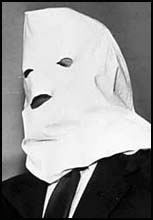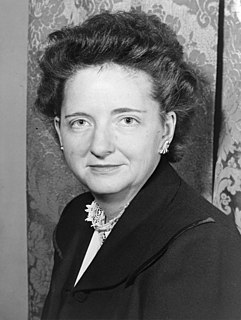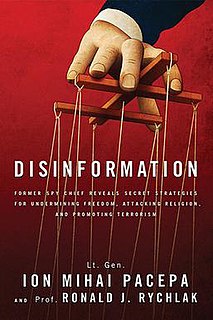Related Research Articles
Espionage or spying is the act of obtaining secret or confidential information or divulging of the same without the permission of the holder of the information. A person who commits espionage is called an espionage agent or spy. Spies help agencies uncover secret information. Any individual or spy ring, in the service of a government, company or independent operation, can commit espionage. The practice is clandestine, as it is by definition unwelcome. In some circumstances, it may be a legal tool of law enforcement and in others, it may be illegal and punishable by law. Espionage is a method of gathering which includes information gathering from non-disclosed sources.
Disinformation is false or misleading information that is spread deliberately to deceive. This is a subset of misinformation.
Earl Edwin Pitts is a former FBI special agent who was convicted of espionage for selling information to Soviet and Russian intelligence services.

Igor Sergeyevich Gouzenko was a cipher clerk for the Soviet embassy to Canada in Ottawa, Ontario. He defected on 5 September 1945, three days after the end of World War II, with 109 documents on the USSR's espionage activities in the West. This forced Canada's Prime Minister Mackenzie King to call a Royal Commission to investigate espionage in Canada.

In politics, a defector is a person who gives up allegiance to one state in exchange for allegiance to another, in a way which is considered illegitimate by the first state. More broadly, it involves abandoning a person, cause, or doctrine to which one is bound by some tie, as of allegiance or duty.

Tinker Tailor Soldier Spy is a 1974 spy novel by British author John le Carré. It follows the endeavours of taciturn, aging spymaster George Smiley to uncover a Soviet mole in the British Secret Intelligence Service. The novel has received critical acclaim for its complex social commentary—and, at the time, relevance, following the defection of Kim Philby. The novel has been adapted into both a television series and a film, and remains a staple of the spy fiction genre.

Oleg Vladimirovich Penkovsky, codenamed HERO, was a Soviet military intelligence (GRU) colonel during the late 1950s and early 1960s. Penkovsky is known for informing the United Kingdom about the Soviet emplacement of missiles in Cuba, thus providing both the UK and the United States with the precise knowledge necessary to address rapidly developing military tensions with the Soviet Union.

Genrikh Samoilovich Lyushkov was an officer in the Soviet secret police and its highest-ranking defector. A high-ranking officer of the NKVD, he played a role in perpetrating Stalin's Great Purge. When, in 1938, he suspected he would soon fall victim to the purge, he fled to the Japanese. Thereafter, he acted as a major source of intelligence for Imperial Japan about the Soviet Union. At the end of World War II, he was killed by the Japanese in order to prevent him from falling back into Soviet hands.

Elizabeth Terrill Bentley was an American spy and member of the Communist Party USA who served the Soviet Union from 1938 until 1945. In 1945, she defected from the Communist Party and Soviet intelligence by contacting the FBI and reporting on her activities.
Anatoly Veniaminovich Gorsky, was a Soviet spy who, under cover as First Secretary "Anatoly Borisovich Gromov" of the Soviet Embassy in Washington, was secretly rezident in the United States at the end of World War II.
Vitaly Sergeyevich Yurchenko is a former high-ranking KGB officer in the Soviet Union. After 25 years of service in the KGB, he defected to the United States during an assignment in Rome. After providing the names of two U.S. intelligence officers who were KGB agents, Yurchenko slipped from the Americans and returned to the Soviets. Although it is unclear whether his initial defection was legitimate, Yurchenko was awarded the Order of the Red Star from the Soviet government for the successful "infiltration operation."

Yuri Alexandrovich Bezmenov, was a Soviet journalist for RIA Novosti and a former PGU KGB informant who defected to Canada.

In September 1960, two U.S. National Security Agency (NSA) cryptologists, William Hamilton Martin and Bernon F. Mitchell, defected to the Soviet Union. A secret 1963 NSA study said that: "Beyond any doubt, no other event has had, or is likely to have in the future, a greater impact on the Agency's security program."

The People's Republic of Zanzibar and Pemba was an African state founded in 1964, consisting of the islands of the Zanzibar Archipelago. It existed for less than a year before it merged with Tanganyika to create the United Republic of Tanganyika and Zanzibar, which would be renamed to Tanzania in October of that year.

Oromay is an Amharic-language novel, published in 1983. It was written by Baalu Girma. The novel presents a cynical account on the Red Star Campaign of the Derg military junta. The book was published by the Kuraz Publishing Agency in Addis Ababa. In spite of a government ban on the book, it became widely read and famous. According to Ruth Iyob, the book presents "an accurate and compelling account of the events surrounding the failure of this campaign".
Lawrence Martin-Bittman, formerly known as Ladislav Bittman, was an American artist, author, and retired professor of disinformation at Boston University. Prior to his defection to the United States in 1968, he served as an intelligence officer specializing in disinformation for the Czechoslovak Intelligence Service.
David Henry Blee served in the Central Intelligence Agency (CIA) from its founding in 1947 until his 1985 retirement. During World War II in the Office of Strategic Services (OSS), he had worked in Southeast Asia. In the CIA, he served as Chief of Station (COS) in Asia and Africa, starting in the 1950s. He then led the CIA's Near East Division.
Sexpionage is the involvement of sexual activity, or the possibility of sexual activity, intimacy, romance, or seduction to conduct espionage. Sex or the possibility of sex can function as a distraction, incentive, cover story, or unintended part of any intelligence operation. Sexpionage is a historically documented phenomenon and even the CIA has previously added Nigel West's work Historical Dictionary of Sexspionage to its proposed intelligence officer's bookshelf. Female agents using such tactics are known as sparrows, while male ones are known as ravens.

Disinformation: Former Spy Chief Reveals Secret Strategies for Undermining Freedom, Attacking Religion, and Promoting Terrorism is a non-fiction book about disinformation tactics and history rooted in information warfare. It was written by former three-star general in the Securitate, the secret police of Socialist Republic of Romania, Ion Mihai Pacepa, and law professor Ronald J. Rychlak. It was published in 2013 along with a companion film, Disinformation: The Secret Strategy to Destroy the West.

Dezinformatsia: Active Measures in Soviet Strategy is a non-fiction book about disinformation and information warfare used by the KGB during the Soviet Union period, as part of their active measures tactics. The book was co-authored by Richard H. Shultz, professor of international politics at Tufts University, and Roy Godson, professor emeritus of government at Georgetown University.
References
- ↑ Roy Pateman (2003), Residual Uncertainty: Trying to Avoid Intelligence and Policy Mistakes in the Modern World , University Press of America, p190
- ↑ Vladislav Krasnov (1985), Soviet Defectors: The KGB Wanted List , Hoover Press, Chapter 8: "Spy and Fake Defectors"
- ↑ "...the redefector - and certainly the fake defector who returns - must be considered as a very effective weapon that can paralyze the opponents' services for a certain length of time and possible can cripple their morale." - Federal government's handling of Soviet and communist bloc defectors: hearings before the Permanent Subcommittee on Investigations of the Committee on Governmental Affairs, United States Senate, One Hundredth Congress, first session, October 8, 9, 21, 1987, Volume 4, p550
- ↑ Roy Pateman (2003), Residual Uncertainty: Trying to Avoid Intelligence and Policy Mistakes in the Modern World , University Press of America, p16
- ↑ John Orr (2010), Romantics and Modernists in British Cinema , Edinburgh University Press, p63
- ↑ Carl Boggs (ed. 2003), Masters of War: Militarism and Blowback in the Era of American Empire , Routledge, p325